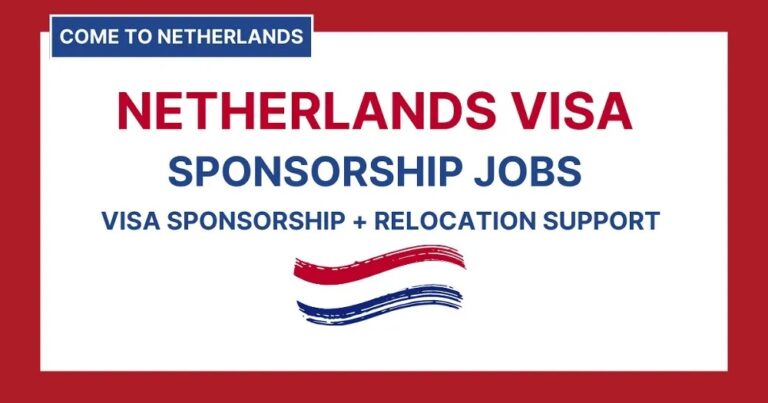$48,000+ Construction Jobs with Visa Sponsorship in the USA
Building Your Future: US Construction Jobs with Visa Sponsorship
Are you a skilled construction professional aiming for career advancement? The United States presents a thriving construction sector with numerous opportunities, especially for those seeking visa sponsorship. This guide provides essential information to navigate the US construction job market and secure a position matching your skills and ambitions.

Why Choose the US Construction Industry?
The US construction industry offers compelling advantages:
- Economic Strength & Growth: The industry significantly contributes to the national GDP, offering consistent job creation fueled by ongoing infrastructure investments.
- High Demand for Skilled Workers: A persistent shortage of skilled workers leads to excellent career prospects and growth opportunities across various specialized roles (project management, engineering, skilled trades).
- Competitive Compensation & Benefits: Expect attractive salaries exceeding industry standards, along with comprehensive benefits packages including health insurance, retirement plans, and professional development. Unions and companies may also offer tuition reimbursement or apprenticeship programs.
- Diverse Career Paths: The industry offers varied specializations (residential, commercial, infrastructure, sustainable building) and career progression opportunities.
- Innovation & Technology: The industry embraces cutting-edge technologies like Building Information Modeling (BIM) and drones, fostering learning and growth for those with technological skills.
- Strong Labor Protections: Unions safeguard worker rights, ensuring fair wages, safe working conditions, and job security.
- Vibrant Culture & Lifestyle: The US boasts diverse communities, a high quality of life, and work-life balance opportunities in many cities.
Visa Sponsorship: Your Path to the US
Visa sponsorship is a significant benefit, allowing skilled workers to legally work and reside in the US. Many employers actively seek and sponsor foreign talent.
Popular Visa Options:
- H-2B Visa: For temporary, non-agricultural construction workers, ideal for seasonal projects.
- H-1B Visa: For professionals in specialized construction-related roles like engineers, architects, and project managers, suitable for long-term employment.
- TN Visa: Available to Canadian and Mexican citizens with job offers in professional occupations like construction management, offering a streamlined application process.
Finding Jobs with Visa Sponsorship:
- Online Job Boards: Utilize platforms like Indeed, LinkedIn, and Glassdoor, searching for listings explicitly mentioning visa sponsorship.
- Recruitment Agencies: Partner with specialized agencies focusing on construction, connecting you with sponsoring employers.
- Networking: Build relationships with US-based and international construction professionals through events, forums, and social media.
Essential Tips for Success in your Job Search:
- Enhance Your Skills: Stay updated on industry trends, technologies, and certifications like OSHA 10/30.
- Prepare for Interviews: Practice common questions, highlighting your relevant skills and motivations for working in the US.
- Understand US Labor Laws: Familiarize yourself with employment regulations, including safety standards and wage laws.
- Build a Strong Network: Cultivate relationships for career insights, referrals, and support.
Eligibility for Visa Sponsorship:
Meeting specific criteria is crucial for securing construction jobs with visa sponsorship.
- Education & Experience: Requirements vary by role, ranging from bachelor’s degrees in relevant fields (engineering, architecture, construction management) to vocational training or apprenticeships for skilled trades.
- Specialized Skills: Demonstrate proficiency in required skills (project management, construction techniques, equipment operation, building codes).
- Relevant Experience: Previous employment, internships, or apprenticeships contribute to meeting experience requirements.
- Valid Job Offer: A formal offer from a US employer willing to sponsor your visa is essential, clearly outlining employment terms. The employer is responsible for filing the visa application.
- Visa Requirements: Each visa type has specific criteria (e.g., H-1B requires a bachelor’s degree; H-2B is for temporary workers; TN is for Canadian/Mexican professionals). Consulting an immigration attorney or the US embassy is advisable.
- English Proficiency: Many employers require demonstrated English proficiency, potentially requiring tests like TOEFL or IELTS.
- Additional Requirements: Background checks, medical examinations, and financial documentation may be necessary.
Tips for Securing Visa Sponsorship:
- Research Visa Options: Determine the most suitable visa based on your circumstances and career goals.
- Network: Build connections for insights and opportunities.
- Prepare Thoroughly: Gather all required documents and prepare for the visa application process in advance.
- Consult an Attorney: Seek guidance from an immigration attorney to ensure a complete and accurate application.
$48,000+ Construction Job Opportunities:
The US construction industry offers numerous lucrative careers exceeding $48,000 annually. Examples include:
- Construction Project Manager: Oversees all aspects of construction projects (Salary: $75,000+). Requires strong leadership, communication, and organizational skills.
- Civil Engineer: Designs and oversees infrastructure projects (roads, bridges, etc.) (Salary: $80,000+). Requires analytical, problem-solving, and communication skills.
- Electrical Engineer: Designs, installs, and maintains electrical systems (Salary: $85,000+). Requires knowledge of electrical engineering principles and safety regulations.
- Mechanical Engineer: Designs and develops mechanical systems (HVAC, plumbing, elevators) (Salary: $80,000+). Requires analytical, problem-solving, and communication skills.
- Construction Superintendent: Oversees daily construction activities (Salary: $65,000+). Requires leadership, communication, and problem-solving skills.
- Plumber: Installs, repairs, and maintains plumbing systems (Salary: $60,000+). Requires practical skills and knowledge of plumbing systems and safety.
- Electrician: Installs, repairs, and maintains electrical systems (Salary: $65,000+). Requires practical skills and knowledge of electrical systems and safety.
- Carpenter: Constructs and repairs wooden structures (Salary: $60,000+). Requires practical skills, attention to detail, and knowledge of carpentry techniques.
- HVAC Technician: Installs, repairs, and maintains HVAC systems (Salary: $55,000+). Requires practical skills and knowledge of HVAC systems and safety.
Essential Tips for Long-Term Success:
Thriving in the US construction industry requires continuous development and strategic thinking.
- Skill Development & Professional Growth:
- Stay updated on industry trends, attend conferences and webinars, and obtain relevant certifications (OSHA, LEED).
- Continuously learn through online courses and training programs.
- Develop leadership skills and build a strong personal brand.
- Networking & Building Relationships:
- Expand your network through industry events and online platforms.
- Join industry associations and be proactive in connecting with others.
- Leverage social media to build your brand and connect with professionals.
- Effective Communication & Teamwork:
- Develop strong communication skills for clear articulation and conflict resolution.
- Foster teamwork and manage expectations effectively.
- Build trust and resolve conflicts constructively.
- Problem-Solving & Adaptability:
- Develop critical thinking and problem-solving skills.
- Be adaptable to changing circumstances and embrace innovation.
- Learn from mistakes and view setbacks as opportunities for growth.
- Safety & Compliance:
- Prioritize safety and adhere to all regulations.
- Promote a safety culture and provide regular safety training.
- Invest in safety equipment.
- Financial Management & Business Acumen:
- Understand business fundamentals (if starting your own business).
- Manage costs effectively and build a strong financial foundation.
- Develop business development skills and manage risks.
Conclusion
Success in the US construction industry hinges on dedication, hard work, and adaptability. Start your journey toward a brighter future today, leveraging the available resources and opportunities for a rewarding career in the heart of the American dream. Your dedication, hard work, and willingness to adapt are the keys to unlocking a promising future in the US Construction Industry.

